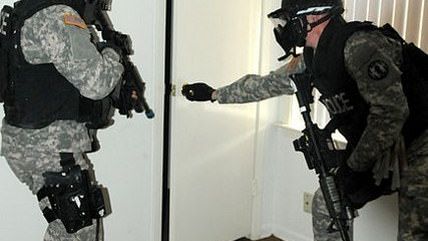Are New York Cops Raiding a Dead Man's Home Just to Squeeze His Son?


Most of the headlines about the bizarre New York City Police Department raids on the Brooklyn home of long-dead James E. Jordan focus on the macabre nature the repeated vists have taken on. Jordan's widow, Karen Fennell, has taken to posting his death certificate on the door so cops forcing their way in can't claim that they don't know he died in 2006.
But if you read the federal lawsuit Fennell filed against the raiding police and New York City (PDF), it looks like the cops may not be as forgetful as they claim. They may just be using the raids premised on a dead man's outstanding warrant to put the screws to his son.
Fannell's lawsuit points out that her husband died on March 17, 2006, and "since that time, including at least four (4) separate occasions this year, defendant officers have appeared at the plaintiffs' home on numerous occasions claiming that they had an arrest warrant for the late James E. Jordan."
Even though the plaintiffs have been forced to take the extraordinary step of affixing James E. Jordan's Death Certificate on their front door indicating that James E. Jordan passed away in March 2006, defendant officers still continue to force their way into the plaintiffs' home under the guise of executing an arrest warrant against said deceased individual.
But do they have any real interest in Jordan Sr.?
Along with Fennell, the plaintiffs in the lawsuit against New York City include James Jordan, Jr. and his friend, Anthony Solis. The lawsuit alleges that James and Anthony were arrested for weapon possession (his lawyer says it was a knife) and other "unspecified charges" after police "stormed into the plaintiffs' home without any warrant and proceeded to perform a warrantless search." The warrantless searches are said to be a regular feature of the police visits, with officers removing personal items when they leave.
Defendants are listed as "John Doe and Jane Doe #1-20 (hereinafter 'defendant officers')," so the latest incident wasn't a casual visit. It was a raid in force.
While at the precinct, James was interrogated by defendant officers who kept asking James to provide them with information concerning drugs and guns in his neighborhood and concerning certain individuals who James doesn't even know.
Eventually, after detaining James and Anthony for several hours, defendant officers released James and Anthony from their unlawful detention but directed them to appear in court to defend the false charges levied against them.
Eventually, after multiple court appearances, the false charges levied against James and Anthony were summarily dismissed.
All that effort, and the charges just go away?
Not surprisingly, given the nature of the intrusions, the plaintiffs are making claims against the raiding cops on grounds involving the Fourth, Fifth, and Fourteenth Amendments. They also allege a failure to train, supervise, and discipline against the NYPD.
But if police are actually interested in the younger Jordan yet have nothing on him, the cops may well know what they're doing. They may well be using the raids in search of a man they know to be dead in order to squeeze the real target of their interest.
Watever the suspected crimes of the younger Jordan, deliberate constitutional violations as a pressure tactic should raise even more concerns than the possibility of a police department too incompetent to acknowledge that a suspect died eight years ago,


Show Comments (25)